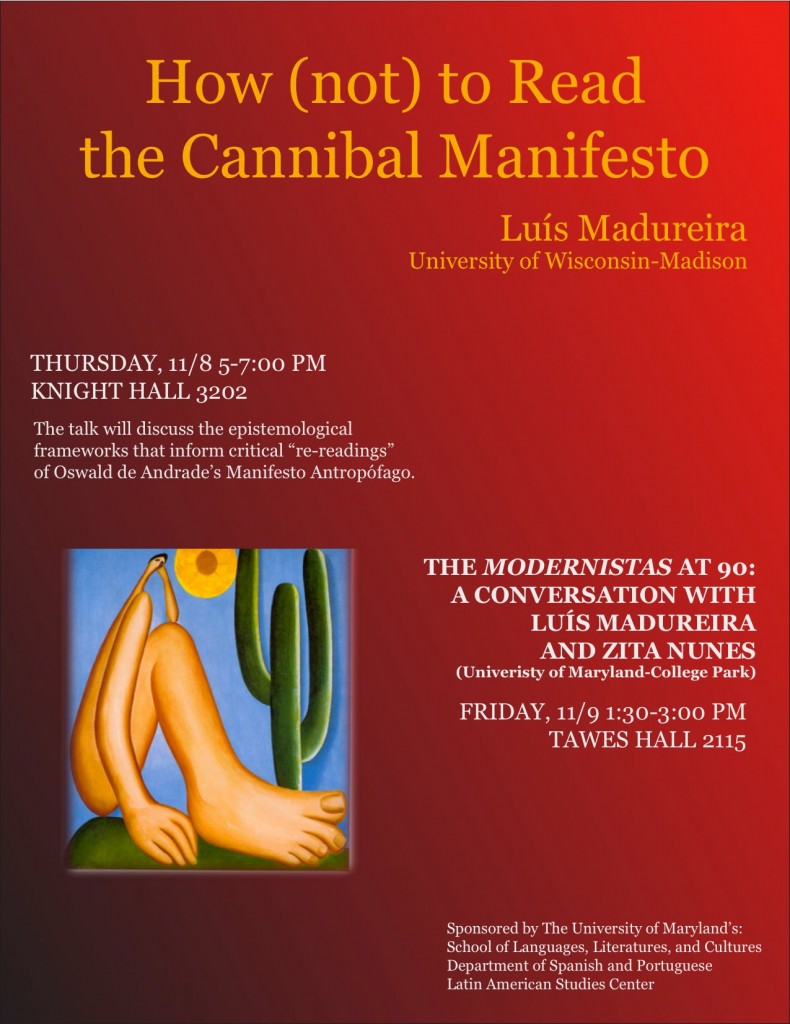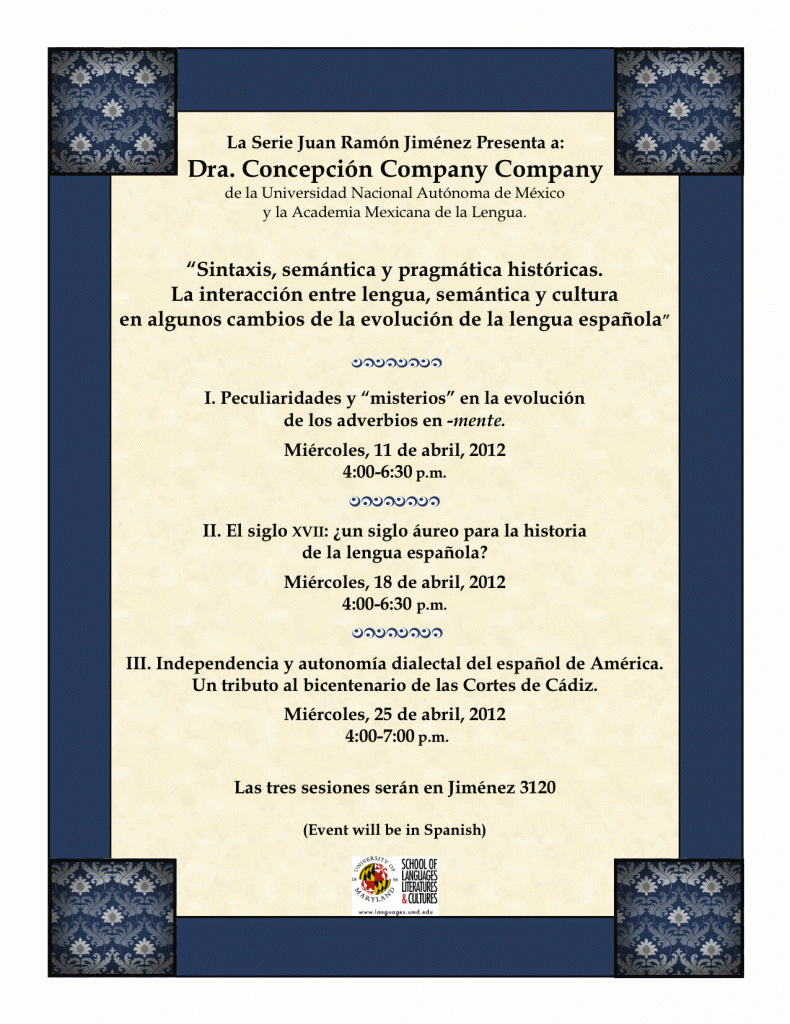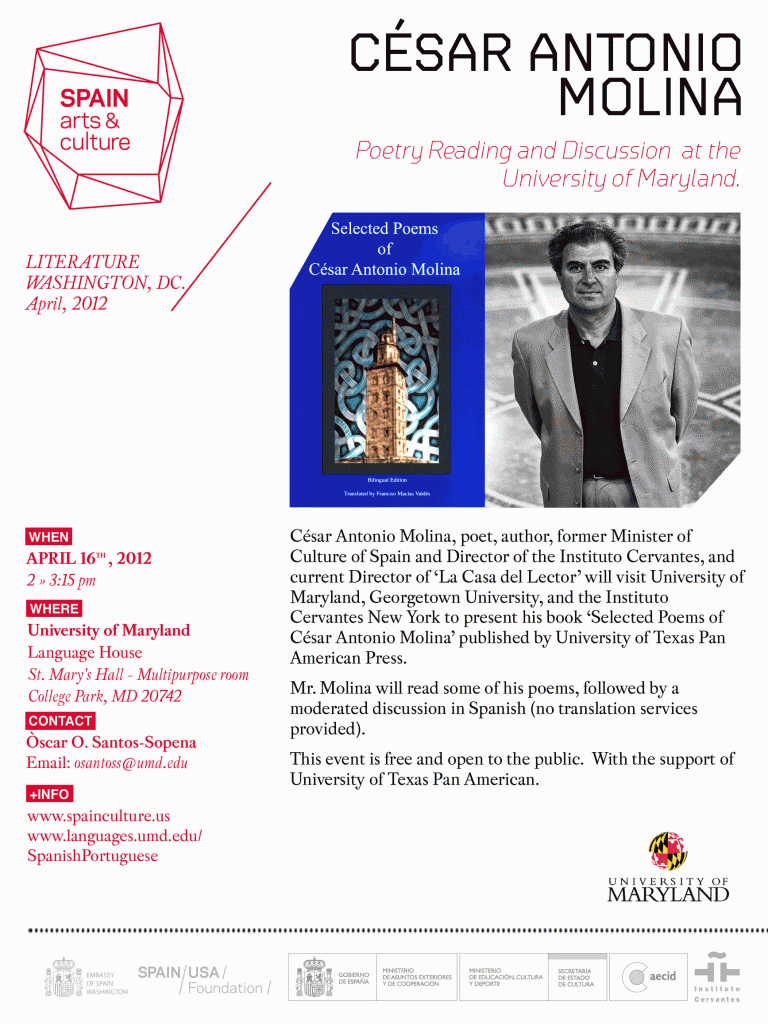A Tribute to José Emilio Pacheco
February 17 at the Mexican Cultural Institute
The University of Maryland’s Department of Spanish and Portuguese and the School of Languages Literatures and Cultures, in collaboration with the Mexican Cultural Institute, are proud to present A Tribute to José Emilio Pacheco. This tribute will honor the lauded Mexican writer José Emilio Pacheco (2009 Cervantes Award Winner) a year after his death with discussion and readings. The event will feature special guest, Cristina Pacheco, prominent Mexican journalist and Pacheco’s wife. Also in attendance will be scholars Saúl Sosnowski and Hernán Sánchez Martínez de Pinillos. Join us at this celebration of José Emilio Pacheco’s extraordinary life and work.
El Departamento de Español y Portugués y la Escuela de Literatura y Culturas de la Universidad de Maryland, en colaboración con el Instituto Cultural de México, se enorgullecen en presentar Un homenaje a José Emilio Pacheco. Este diálogo y lectura de la obra de Pacheco honrará la memoria del galardonado escritor mexicano (Premio Cervantes 2009) a un año de su fallecimiento. En el evento participará como invitada especial Cristina Pacheco, destacada periodista mexicana y esposa del escritor, así como los acádemicos expertos en literatura hispana Saúl Sosnowski y Hernán Sánchez Martínez de Pinillos. ¡Acompáñenos en esta celebración a la vida y obra de José Emilio Pacheco!
More info: http://www.instituteofmexicodc.org/index.php#pacheco
This event will be held in Spanish
Queer Baroque: Nestor Perlongher takes a stroll down the Parque Lezama
Rubén Ríos Ávila
The distinguished Professor Ruben Rios Avilia will present his study of the exploration of the intersection of baroque poetry and queer theory through the comparison of the poetics of Cuban neo-baroque poet José Lezama Lima and Argentinian queer activist and neo-baroque poet Nestor Perlongher. The analogy will be explored from the stand-point of Góngora’s poetics and Deleuze’s philosophy of the fold.
He will also be meeting with Graduate Students for further discussion on Friday, November 16th at 3:30 PM in the Sala Pacheco, 2215 JMZ
Oscar Santos Sopena receives the 2012 Graduate Student Minority Achievement Award
Our graduate student, Oscar Santos, have been selected to receive the 2012 Graduate Student Minority Achievement Award to recognize the many outstanding contributions and accomplishments he has made for the University. The awards ceremony will be held on Thursday, May 10th at 4:00pm – 5:30pm in the Maryland Room, Marie Mount Hall. Oscar will also get a congratulatory letter from President Loh in a few days. Please feel free to invite your family, friends, and colleagues to the ceremony. Invitations will be forwarded to all vice-presidents, deans, directors, and department chairs,as well as many other members of the campus community.
Felicitaciones, te lo mereces, Oscar.
EL RAPTO DE EUROPA presented by los Jimediantes Theatre Company
The Department of Spanish & Portuguese, School of Languages, Literatures and Cultures, presents Los Jimediantes Theatre Company in EL RAPTO DE EUROPA/ THE RAPTURE OF EUROPE
by Max Aub
The Spanish Civil War, Refugees, Concentration Camps, NGOs, France and World War II Resistance…
College Park, MD – Los Jimediantes, the newly founded theater company of the Department of Spanish and Portuguese, School of Languages, Literatures, and Cultures at the University of Maryland, makes its debut with
The Rapture of Europe (1943) by acclaimed Spanish playwright Max Aub. Adapted and directed by José María Naharro-Calderón, The Rapture of Europe will be presented in Spanish, English, French, Italian and German with English supertitles at 7:30 pm on consecutive Thursdays, May 3rd and May 10th, 2012, in the Ulrich Recital Hall, Tawes Fine Arts Building, University of Maryland, College Park. This performance is free of charge and a reception will follow the opening night’s performance.
ABOUT THE PRODUCTION
In the same vein as the masterpiece works of theater by Bertold Brecht, and rooted in powerful experiential testimony, The Rapture of Europe, also known as, Something Can Always Be Done by Max Aub, reveals the ins and outs of the international resistance network in Marseilles during World War II. In particular, it focuses on the work of the Emergency Rescue Committee (ERC), one of the organizations that took charge between 1940 and 1942 of facilitating the escapes of a group of European intellectuals and resistance leaders whose lives were put in danger by totalitarian and fascist regimes across Europe. This cohort included but was not limited to: Anna Arendt, Walter Benjamin, André Breton, Marc Chagall, Marcel Duchamp, Max Ernst, Wassili Kandinsky, Clara Malraux, Benjamin Péret, Anna Seghers, Victor Serge, Remedios Varo, and Max Aub. It is a clandestine world that the playwright brings to life through the experiences of his protagonist, Margaret Palmer, (a friend of the journalist Jay Allen [Bob] who conflicts with another director of the ERC, Varian Fry), the anguish and needs of the refugees [Anna, Francisco], the aid provided by the Mexican consulate under the charge of Gilberto Bosques, and the lack of political support from the United States [Hope]. Also represented in the play are ideological resistance [Bozzi], the gangster types interested in making a profit by any means necessary [Roger], the strength and ethics of the persecuted Spanish Republicans, and the tremulous relationship that pits Rafael between Adela, his lover, and Luisa, his wife. The duality between troubled love and solidarity is reminiscent of the movie Casablanca (1942). But where The Rapture of Europe departs from Michael Curtiz’s film is in the prominence of the female trio (Margaret, Adela, Luisa), revealing the author’s feelings toward a world in which masculine heroes like Rafael end up playing a secondary role.
Threatened by inhumane acts, in Aub’s universe, women rise above social and genre barriers to participate in solidarity movements where thousands of tireless hands work to preserve universal principles, such as liberty, democracy and human dignity. This is the story of a world torn apart by the threat of fascist and nazi totalitarianisms like ours may be crumbling today under financial stings and civil liberties curtailments. The play touches particularly upon this latter threat as denounced by Holocaust survivors like Primo Levi and may reflect contemporary issues such as the plight of economic refugees, unemployed persons, and the homeless: the 99% of the Occupy Wall Street Movement. These new “others” have shifted the diaspora of Aub’s characters but not the importance of their call to action.
ABOUT THE PLAYWRIGHT
Max Aub Mohrenwitz (Paris 1903-Mexico City 1972) is a transnational writer avant la lettre and one of the most brilliant Spanish intellectuals of the 20th century. At the beginning of World War I in 1914, his family took refuge in Valencia (Spain) where Max was naturalized and later began his writing career solely in Spanish. After the outbreak of the Spanish Civil War in July 1936, he was sent to Paris as the Cultural Attaché at the Embassy of the Spanish Republic. There he also acted as coordinator of the Spanish Pavilion at the International Exposition of 1937, where he skillfully presented for the first time Pablo Picasso’s Guernica, the exposition’s center piece. After the defeat of Republican Spain (1939), Aub was unable to board in France any of the ships freighted by the Spanish Republic in exile. He managed to live quietly in Paris until this agnostic social humanist was denounced anonymously and calumniously as a dangerous communist militant of Jewish confession. He was consequently arrested by the French authorities of the Third Republic (1870-1940) and sent to the concentration camp in Le Vernet d’Ariège along with other prominent European antifascists (Arthur Koestler, Rudolf Leonhard, Francesco Nitti, Gustav Regler). He was eventually released and assigned to a residence in Marseilles, where he was protected by his friend, the protagonist of The Rapture of Europe, Margaret Palmer, co-worker of Varian Fry’s Emergency Rescue Committee. Detained again in September 1941 and sent back to Le Vernet d’Ariège by the Vichy authorities (1940-44), he was then deported to one of the several French colonial concentration camps, the ominous Djelfa enclave in Algeria. In May 1942, he managed to escape and hide in Casablanca until sailing to Mexico in November, 1942.
Among his other works are his pentalogy on the Spanish Civil War: The Spanish Labyrinth (1943-1968); his masterpieces on the concentration camps (poetry, short stories and a film script): Diario de Djlefa (1944), Manuscrito cuervo (1955), and Campo francés (1965); his “Major Theater”: San Juan (1942), El Rapto de Europa (1943) [premiere in English in Pasadena, 1945], Morir por cerrar los ojos (1944), No (1951); his spoof on Picasso’s pseudo artist friend: Josep Torres Campalans (1958); his foreshadowing diary after his 1969 visit to Franco’s Spain, La gallina ciega (1973); his essays: Hablo como hombre (1951); and his histories and biographies: Manual de historia de la literatura española (1974), and Conversaciones con Buñuel (1984).
ABOUT THE DIRECTOR
Dr. José M. Naharro-Calderón has always enjoyed the stage. His last role was M. Martin in Eugène Ionesco’s
La cantatrice chauve. Dr. Naharro-Calderón is an Associate Professor at the University of Maryland. He teaches Spanish contemporary literature, culture, film, and exile studies.
ABOUT THE CAST
Los Jimediantes Theatre Company is composed entirely of faculty and students of the University of Maryland. The Rapture of Europe is performed by Sebastián Delta (Bozzi), Mario Escobar (Rafael), Andrea Fanta (Margarita in Spanish), María Gómez-Martín (Luisa), Chris Lewis (Bob), Andrew Milacci (Hope), Lina Morales-Chacana (Anna), José M. Naharro-Calderón (Francisco), Òscar Santos-Sopena (Bellboy), Leonardo Solano (Roger), and Lisa Warren (Margaret in English). Set design and costumes by Los Jimediantes and Natasha Joyce. Stage manager and sound by Nicholas Boltz and supertitles and projections by Lindsay Kermisch. Ushers: Abigail Barenblitt and Sarah Woolsey.






